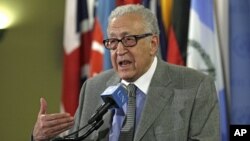UNITED NATIONS —
The United Nations Special Representative on Syria, Lakhdar Brahimi, warned Thursday that the situation is worsening in Syria and the parties are no closer to reaching any kind of political settlement that will end the bloodshed.
Brahimi briefed the U.N. Security Council in a private meeting on his recent travels to meet with regional and international players in the Syrian crisis. Afterwards he spoke to reporters.
“There is no doubt that I think it’s very, very clear the people of Syria want change - and real change - not cosmetic change," he said. "How, what form that will take, we definitely would like to avoid the state institutions to wither away, and we would like to see a peaceful evolution towards the new Syria. The new Syria will not look like the Syria of today."
Brahimi said the situation is getting worse and that the government and opposition are still far apart.
“That, unfortunately, the parties themselves are not ready to have an internal solution. The region is also not really capable at this time of helping for a peaceful solution," he said.
He said a cease-fire that can hold is urgently needed. Two attempts, one by his predecessor Kofi Annan, and another last month during the Muslim feast of Eid al-Adha, both quickly collapsed, leading to a resumption of the hostilities that have killed more than 40,000 people.
Without elaborating, Brahimi said he has the elements for a plan for Syria, but that they cannot come together without the help of a united U.N. Security Council, which has the power to put the plan into a binding resolution that could be the basis for a political process.
The 15-nation council has been deeply divided since the crisis began some 20 months ago, with Russia using its veto three times to prevent tough action against the government of Syrian President Bashar al-Assad.
Russian Ambassador Vitaly Churkin told reporters that Moscow is very disturbed about the situation, including what he characterized as “brazen terrorist attacks” with “clear sectarian connotation.” He said the violence must stop quickly and a political process put into action, and that Moscow is actively working to accomplish this.
“We are trying to impress on the government in Syria that there is no military solution," Churkin said. "That they must be preparing to enter into serious dialogue with opposition groups. We are talking to various opposition groups, including conversations today by Foreign Minister [Sergei] Lavrov and others in Moscow with National Coordinating Council and other opposition groups."
The Russian ambassador dismissed accusations that his government has offered unqualified support to President Assad’s regime, saying Moscow believes the opposition should be involved in dialogue and that political transition is necessary.
Brahimi will brief the full U.N. General Assembly on the status of his mission on Friday.
Brahimi briefed the U.N. Security Council in a private meeting on his recent travels to meet with regional and international players in the Syrian crisis. Afterwards he spoke to reporters.
“There is no doubt that I think it’s very, very clear the people of Syria want change - and real change - not cosmetic change," he said. "How, what form that will take, we definitely would like to avoid the state institutions to wither away, and we would like to see a peaceful evolution towards the new Syria. The new Syria will not look like the Syria of today."
Brahimi said the situation is getting worse and that the government and opposition are still far apart.
“That, unfortunately, the parties themselves are not ready to have an internal solution. The region is also not really capable at this time of helping for a peaceful solution," he said.
He said a cease-fire that can hold is urgently needed. Two attempts, one by his predecessor Kofi Annan, and another last month during the Muslim feast of Eid al-Adha, both quickly collapsed, leading to a resumption of the hostilities that have killed more than 40,000 people.
Without elaborating, Brahimi said he has the elements for a plan for Syria, but that they cannot come together without the help of a united U.N. Security Council, which has the power to put the plan into a binding resolution that could be the basis for a political process.
The 15-nation council has been deeply divided since the crisis began some 20 months ago, with Russia using its veto three times to prevent tough action against the government of Syrian President Bashar al-Assad.
Russian Ambassador Vitaly Churkin told reporters that Moscow is very disturbed about the situation, including what he characterized as “brazen terrorist attacks” with “clear sectarian connotation.” He said the violence must stop quickly and a political process put into action, and that Moscow is actively working to accomplish this.
“We are trying to impress on the government in Syria that there is no military solution," Churkin said. "That they must be preparing to enter into serious dialogue with opposition groups. We are talking to various opposition groups, including conversations today by Foreign Minister [Sergei] Lavrov and others in Moscow with National Coordinating Council and other opposition groups."
The Russian ambassador dismissed accusations that his government has offered unqualified support to President Assad’s regime, saying Moscow believes the opposition should be involved in dialogue and that political transition is necessary.
Brahimi will brief the full U.N. General Assembly on the status of his mission on Friday.




